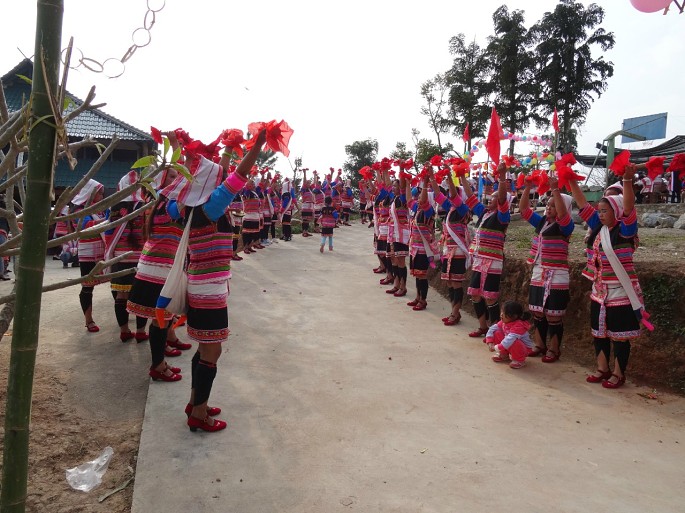
Baka Jinuo Village of Jinuo Town in Jinghong City, Xishuangbanna
🌄 Quick Glance
Just 28 km east of Jinghong City, deep in the lush Jinuo Mountains, Baka Village condenses the ancient songs, tropical rainforest, and starry skies of China’s 56th ethnic group—the Jinuo people—into an immersive “mountain lifestyle festival” that needs no filter.
📍 Geographic Coordinates
Location: Southeastern Jinuo Township, Jinuo Mountains, Jinghong, Xishuangbanna, Yunnan, China
-
28 km (45 min drive) from downtown Jinghong
-
18 km from Xishuangbanna Tropical Botanical Garden (XTBG)
-
30 km from Gaozhuang Xishuangjing
Navigation Keywords: Jinghong – Jinuo Mountain – Baka Village
🧬 History & Heritage
-
Ethnic Roots: The Jinuo people were the last ethnic group officially recognized by China in 1979. With only around 24,000 people, over 90% live in the Jinuo Mountains. Baka is one of their core ancestral villages.
-
Name Origin: “Baka” means “village on the river fork” in the Jinuo language, named for its unique location among three converging rivers and encircling rainforest.
-
Recognition: Selected as a “Beautiful Village of Yunnan” and “Sanitary Village” in 2021. Designated as a Key Ethnic Cultural Tourism Village by Xishuangbanna Prefecture.
📸 Top 5 Must-See Highlights
🌫️ Yinzhang Upper Village
-
Altitude: 1,200 m – Offers sunrise above the clouds, stargazing camps, mid-mountain gardens, and a grass slide park.
-
In partnership with XTBG, it hosts 6 birdwatching ponds, home to 120+ forest bird species—a hotspot for photographers.
🍃 Jinuo Ancient Tea Garden
-
Over 3,000 mu (200+ hectares) of century-old tea trees.
-
During the spring tea season (March–April), visitors can experience the full journey “from leaf to teacup.”
🥁 Jinuo Drum Dance
-
Two daily authentic cultural performances at 10:30 AM and 3:30 PM.
-
Don’t miss the 7-meter-tall solar drum, which echoes through the mountains.
🌳 Rainforest Hiking
-
4 km beginner trail: Highlights include strangler figs, aerial gardens, and wild dendrobiums.
-
8 km advanced trail: Includes rappelling, jungle swings, and more adrenaline.
🔥 Temaoke Festival
-
Held annually from February 6–8 to celebrate Jinuo New Year.
-
Features bull sacrifices, fireworks from molten iron (datiehua), and a massive group drum dance.
🧭 Suggested Itineraries
🕐 One-Day Light Tour
Depart Jinghong → Tea picking in the ancient garden → Watch the drum dance → Rainforest hike → Sunset & stargazing in Yinzhang Upper Village → Overnight camping → Return next morning
🏕️ Two-Day In-Depth Trip
Day 1: Tea-making in the morning → Rainforest hike in the afternoon → Stargazing camp at Yinzhang
Day 2: Sunrise above the clouds → Jinuo weaving workshop → Visit Gaozhuang Night Market
🎓 Educational & Voluntourism
Join the XTBG team for conservation work like Asian elephant habitat monitoring and biodiversity surveys (Booking required 3 days in advance)
🚗 Transportation Guide
✈️ By Air
Fly to Xishuangbanna Gasa Airport, then take a ride-hailing service (~45 min, ~¥80) to Baka Village.
🚘 By Car
From Jinghong → G219 Highway → Jinuo Township → Baka Village (Fully paved road, sedan-friendly)
🚌 By Bus
From Gaozhuang North Bus Terminal in Jinghong:
Daily buses at 08:30 & 14:00, ¥15/person, ~1 hour travel time
🧰 Visitor Info
-
Entry Fee: Free to enter the village
-
Sightseeing Shuttle (Yinzhang): ¥20/person
-
Grass Slide Park: ¥30/person
🏕️ Accommodation
-
Yinzhang Stargazing Tents: ¥280–¥380/night (incl. breakfast)
-
Baka Mountain Guesthouse: ¥180–¥260/night (Traditional Jinuo stilt houses)
🍽️ Food
-
Jinuo Bamboo Tray Feast: Includes grilled chicken, bamboo rice, bitter bamboo shoot soup – ~¥60/person
-
Jungle Vegetables: Picked and cooked on-site
🎁 Souvenirs
-
Jinuo solar drum miniatures
-
Old tree white tea
-
Rainforest honey
⚠️ Tips
-
Prepare for a 10°C+ day-night temperature difference – bring layers.
-
Respect local customs: Do not step on thresholds, and don’t point at sacred mountains.
-
Wear non-slip shoes for hiking; bring mosquito repellent and long pants for rainforest trekking.
🌅 Final Words
When the solar drum echoes above the clouds, the thousand-year legend of Jinuo Mountain unfolds between the fragrance of tea and the starlit sky. Baka Village is Xishuangbanna’s wildest ethnic hideaway, and the closest rainforest utopia to the city.

 7 Days GolfingTour
7 Days GolfingTour
 8 Days Group Tour
8 Days Group Tour
 8 Days Yunnan Tour
8 Days Yunnan Tour
 7 Days Shangri La Hiking
7 Days Shangri La Hiking
 11 Days Yunnan Tour
11 Days Yunnan Tour
 6 Days Yuanyang Terraces
6 Days Yuanyang Terraces
 11 Days Yunnan Tour
11 Days Yunnan Tour
 8 Days South Yunnan
8 Days South Yunnan
 7 Days Tea Tour
7 Days Tea Tour
 8 Days Muslim Tour
8 Days Muslim Tour
 12 Days Self-Driving
12 Days Self-Driving
 4 Days Haba Climbing
4 Days Haba Climbing
 Tiger Leaping Gorge
Tiger Leaping Gorge
 Stone Forest
Stone Forest
 Yunnan-Tibet
Yunnan-Tibet
 Hani Rice Terraces
Hani Rice Terraces
 Kunming
Kunming
 Lijiang
Lijiang
 Shangri-la
Shangri-la
 Dali
Dali
 XishuangBanna
XishuangBanna
 Honghe
Honghe
 Kunming
Kunming
 Lijiang
Lijiang
 Shangri-la
Shangri-la
 Yuanyang Rice Terraces
Yuanyang Rice Terraces
 Nujiang
Nujiang
 XishuangBanna
XishuangBanna
 Spring City Golf
Spring City Golf
 Snow Mountain Golf
Snow Mountain Golf
 Stone Mountain Golf
Stone Mountain Golf

















